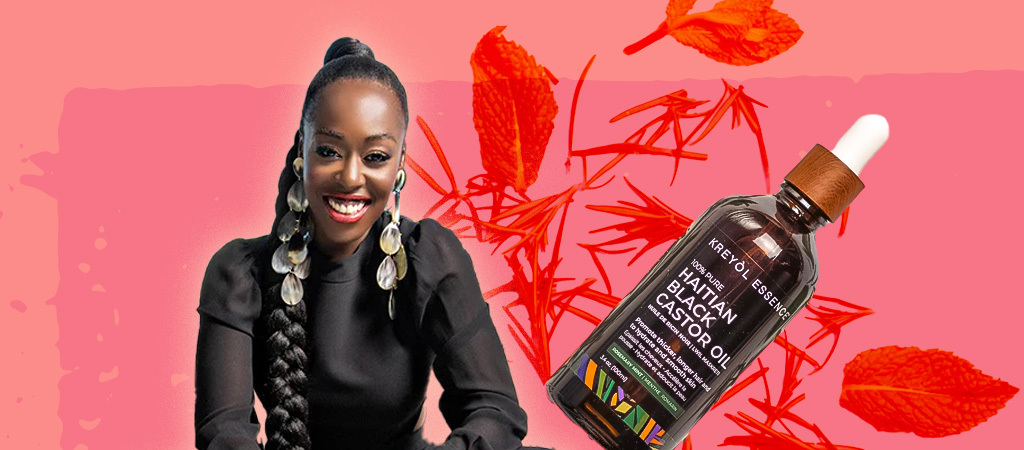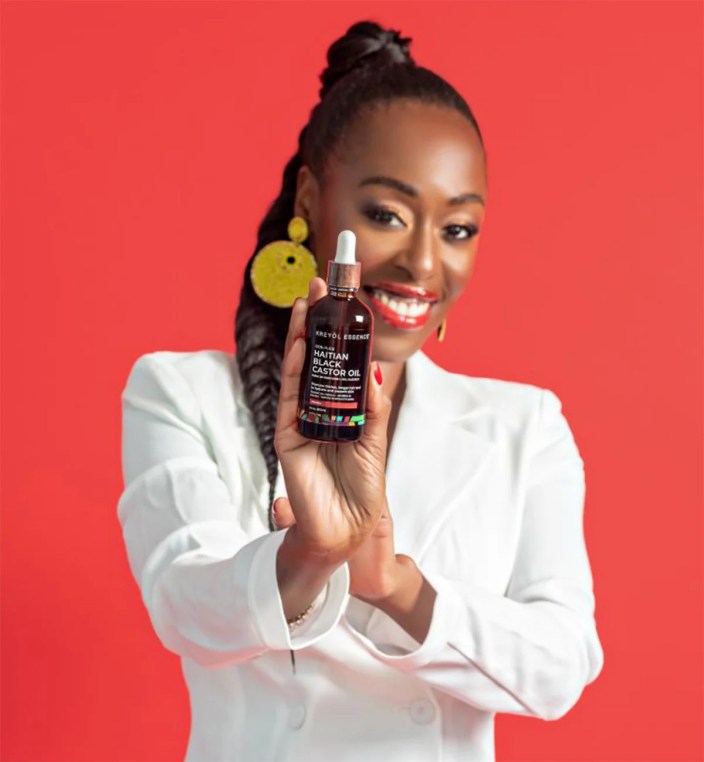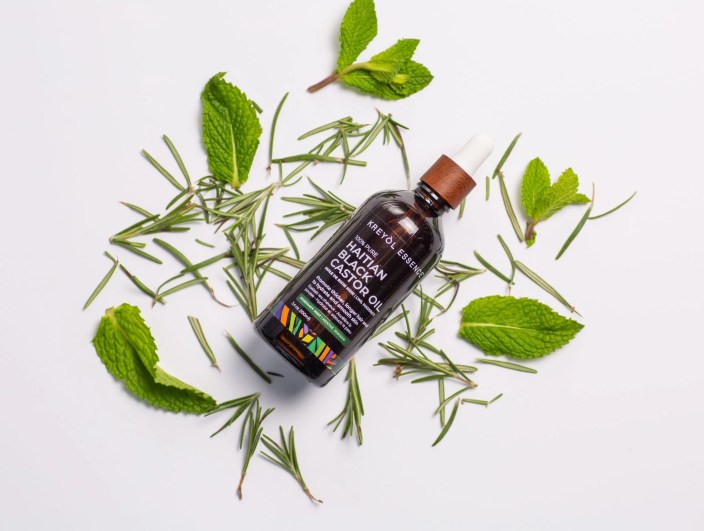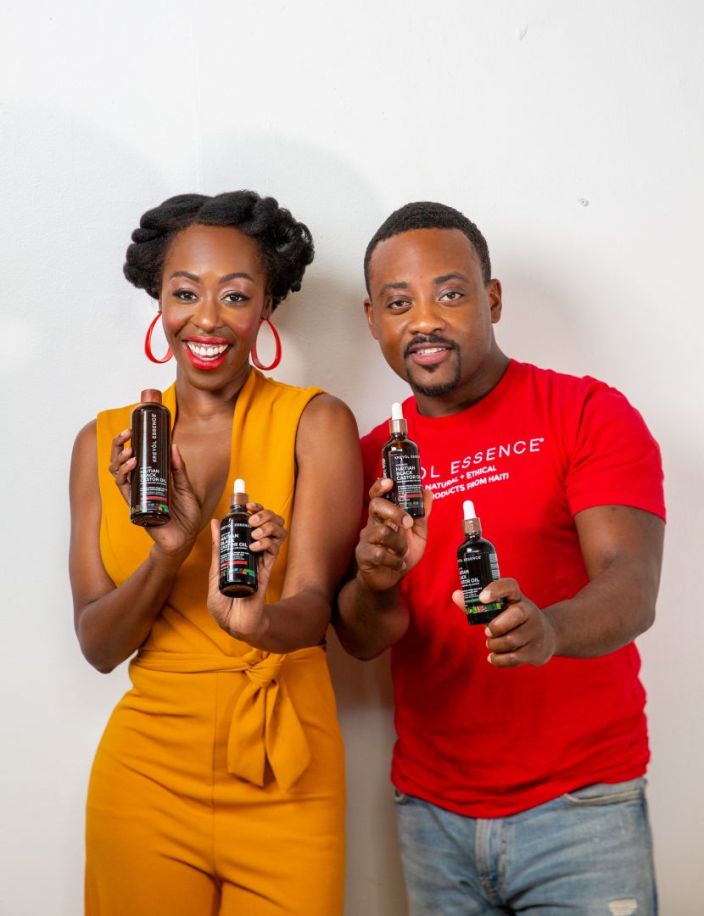
The beauty industry generated over $625 billion in revenue for businesses in 2023, representing a 45% increase from 2022, and yet when Yve-Car Momperousse came up with the idea for Kreyòl Essence, it was because she noticed that something was lacking in the space. Faced with a series of haircare catastrophes, Yve-Car knew the one product that could save her natural hair from the heat damage she suffered was Haitian Black Castor Oil. There was only one problem: in 2009, Haitian Black Castor Oil was in short supply, and she was totally unable to find it at the specialty cosmetics stores in Philadelphia, where she was living at the time.
In that moment, the kernel of an idea that would grow into Kreyòl Essence was born.
After participating in a business incubator at Cornell, Kreyòl Essence was officially founded in 2014. That’s when the husband-and-wife team of Yve-Car and Stephane began building their beauty empire while ensuring that their success would benefit Haiti directly. To do so, they purchased their own farm, and as one of their first steps, they started employing local farmers both there and in surrounding cooperatives, offering them double the average pay.
Ensuring that all of their local partners have livable wages wasn’t a symbolic gesture, but rather, it was a necessary step for the company, which has employed over 300 artisans and more than 5,500 farmers to date. That commitment stems from Yve-Car’s longtime work in activism in the Haitian community. When founding Kreyòl Essence, her vision of agricultural sustainability and financial self-sufficiency was an absolute non-negotiable.

Kreyòl Essence’s success definitely didn’t happen overnight. While 2014 saw them hit a modest $135,000 in sales, the business struggled in 2016 when that number dwindled down to $40,000 when they were focused on selling products in bulk and saw one of their key finance partners step away. That obstacle, however, presented an opportunity to the nascent business owners as they shifted their focus away from bulk sales and began targeting a direct-to-consumer model. The savvy decision paid off, with 2017 representing a major growth year where their sales shot up to $327,000. They then crossed the $1 million sales mark in 2018 and doubled that figure the following year after receiving a major deal with the American cosmetics industry’s largest retailer, Ulta Beauty.
The partnership with Ulta Beauty was a game-changer for Kreyòl Essence, allowing the brand to put its products in front of millions of consumers and feature them in over 1,200 stores across all 50 states. In 2023, they were recognized as one of the fastest-growing black-owned businesses in the country, with a revenue growth of 540% over the previous two years.

That’s not the only time that the brand saw a major spike in interest and sales, however. Back in 2020, their founders appeared on Shark Tank, resulting in a strategic partnership with one of the hosts and a 506% jump in their website traffic, along with a 214% increase in their online sales. Building a strong online following has been crucial to the business’s success because beauty is a very personal thing for consumers. A direct connection between the brand and the people buying its products strengthens those ties and has boosted its repeat-buyer figures.
In 2023, their success with Ulta Beauty saw Yve-Car and Stephane named mentors in the brand’s MUSE Accelerator program, giving them a direct hand in molding future leaders in the cosmetics space. That honor came on the heels of them being awarded as part of Ulta’s Muse 100 program, which awarded grants to their 100 most inspiring retail partners.
Yve-Car and Stephane’s work hasn’t escaped recognition outside of Ulta Beauty, either. They were recently named finalists for Pharrell’s Black Ambition Awards and had their products featured in Oprah Daily. It’s true that their work in social activism and the brand’s strong cultural ties to Haiti are a source of pride, but they are also quick to highlight that 60% of their customers, per Ulta Beauty’s market research, identify as non-black. Stephane said, “This is indicative of our market penetration and our ability to speak and relate with a broad consumer base, and it embodies my new philosophy of For All By Us.”
Each of these recognitions has gone a long way toward keeping the business successful, but that hasn’t distracted the two from keeping the economic development of their employees and agricultural partners at the heart of what they do. Crucially, they’ve been sure to make revitalizing Haiti a part of their mission at every step of the way. To incorporate agricultural sustainability as a part of their business model, they’ve planted over 100,000 castor trees and cultivated over 150 hectares of land, which helps to ethically grow their business and provides more employment opportunities for farmers on the island.
Stephane isn’t hesitant to note that Kreyòl Essence has been a bootstrap organization for 10 years despite all of its success. The company’s biggest obstacles have come in the form of navigating global supply chain issues and securing capital, but they’ve remained resilient thanks to a combination of its co-founders’ can-do attitude and commitment to its founding principles. According to the two, “The revival of Haiti’s economy will come from job creation—not donations. Education, health, and poverty alleviation can all be improved when people have income and unemployment is reduced. This is what we are championing as a brand.”
With women representing 71% of Kreyòl Essence’s executive-level team and thousands of Haiti’s local female farmers employed under their efforts, it’s clear that they’re walking the talk.

